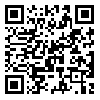Volume 26, Issue 2 (2024)
JAST 2024, 26(2): 287-298 |
Back to browse issues page
Download citation:
BibTeX | RIS | EndNote | Medlars | ProCite | Reference Manager | RefWorks
Send citation to:



BibTeX | RIS | EndNote | Medlars | ProCite | Reference Manager | RefWorks
Send citation to:
Poyafar A M, Arzani A, Javadi S A, Tahmasebi A. Social Capital Drives Beekeeping as Livelihood Diversification Strategy: A Study of Pastoralists in Northeast Iran. JAST 2024; 26 (2) :287-298
URL: http://jast.modares.ac.ir/article-23-64091-en.html
URL: http://jast.modares.ac.ir/article-23-64091-en.html
1- Department of Nature Engineering, Faculty of Natural Resources and Environment, Science and Research Branch, Islamic Azad University, Tehran, Islamic Republic of Iran.
2- Faculty of Natural Resources, College of Agriculture and Natural Resources, University of Tehran, Karaj, Islamic Republic Iran.
3- Department of Human Geography, Faculty of Geographical Sciences, Kharazmi University, Tehran, Islamic Republic of Iran. ,desertcontrol@yahoo.com
2- Faculty of Natural Resources, College of Agriculture and Natural Resources, University of Tehran, Karaj, Islamic Republic Iran.
3- Department of Human Geography, Faculty of Geographical Sciences, Kharazmi University, Tehran, Islamic Republic of Iran. ,
Abstract: (1231 Views)
Beekeeping on rangelands is considered as a key approach for sustaining pastoral livelihood and reducing pressure on grazing lands. Previous studies are mostly focused on the ecological contributors of apiculture and the social criteria are not treated in much detail. The current research, therefore, uses the case of Sarayan Arid Rangelands in northeast Iran to examine the importance of social capital in adaptation of beekeeping as a pastoral livelihood diversification strategy. Through a random sampling procedure, 180 herders were selected in the study area. Questionnaires were used to collect data on trusts, collaboration, and solidarity as the main determinants of social capital and also herders' interests in beekeeping. Stepwise linear regression method was employed to estimate the relation between herders' interest in beekeeping and their social capital. The results show that about 33% in variance of motivation on beekeeping as a livelihood diversification strategy could be explained by the cooperation, trust, and solidarity among the rangeland users. Therefore, it is vital to introduce policies and measures to support collaboration and social networks among the rangeland users.
Article Type: Original Research |
Subject:
Agricultural Extension and Education/Agricultural Development
Received: 2022/09/9 | Accepted: 2023/03/13 | Published: 2024/03/9
Received: 2022/09/9 | Accepted: 2023/03/13 | Published: 2024/03/9
Send email to the article author
| Rights and permissions | |
 |
This work is licensed under a Creative Commons Attribution-NonCommercial 4.0 International License. |








